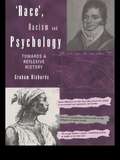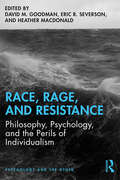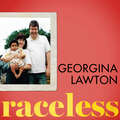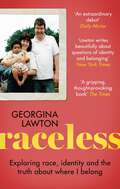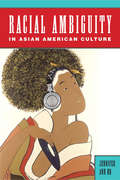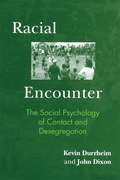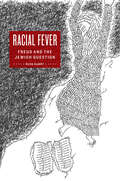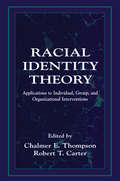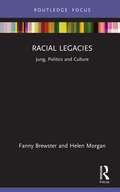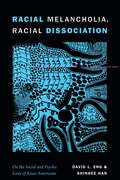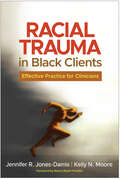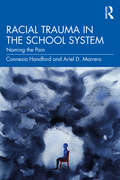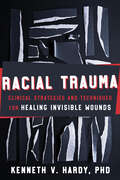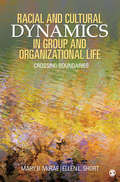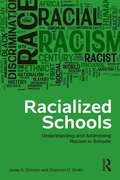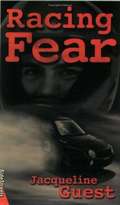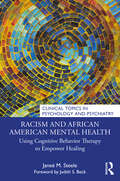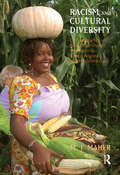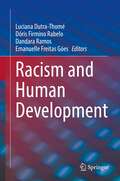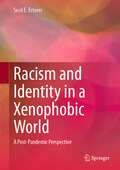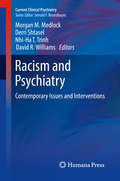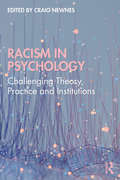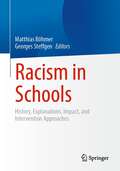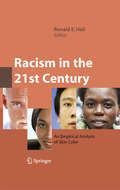- Table View
- List View
Race, Racism and Psychology: Towards a Reflexive History
by Graham RichardsTopics with racial implications have been hotly debated in the psychological literature for most of this century and are often in the news. Graham Richards takes a historical look at how the concepts of "race" and "racism" emerged within the discipline and charts the underlying premises of some famous studies in their social and political contexts. No-one is allowed to be objective in this arena, as opponents will always argue that they are not. This account is bound therefore to be controversial and excite interest whether or not readers agree with Richards' stance.
Race, Rage, and Resistance: Philosophy, Psychology, and the Perils of Individualism (Psychology and the Other)
by Eric R. Severson Heather Macdonald David M. GoodmanThis timely collection asks the reader to consider how society’s modern notion of humans as rational, isolated individuals has contributed to psychological and social problems and oppressive power structures. Experts from a range of disciplines offer a complex understanding of how humans are shaped by history, tradition, and institutions. Drawing upon the work of Lacan, Fanon, and Foucault, this text examines cultural memory, modern ideas of race and gender, the roles of symbolism and mythology, and neoliberalism’s impact on psychology. Through clinical vignettes and suggested applications, it demonstrates significant alternatives to the isolated individualism of Western philosophy and psychology. This interdisciplinary volume is essential reading for clinicians and anyone looking to augment their understanding of how human beings are shaped by the societies they inhabit.
Raceless: Exploring race, identity and the truth about where I belong (Language Acts and Worldmaking #25)
by Georgina LawtonA GUARDIAN, SUNDAY TIMES, EVENING STANDARD AND COSMOPOLITAN BOOK OF THE YEAR FOR 2021In Georgina Lawton's childhood home, her Blackness was never acknowledged; the obvious fact of her brown skin, ignored by her white parents. Over time, secrets and a complex family story became accepted as truth and Georgina found herself complicit in the erasure of her racial identity.It was only when her beloved father died that the truth began to emerge. Fleeing the shattered pieces of her family life and the comfortable, suburban home she grew up in, at age 22 Georgina went in search of answers - embarking on a journey that took her around the world, to the DNA testing industry, and to countless others, whose identities have been questioned, denied or erased.What do you do when your heritage or parentage has been obscured in a complex web of deceit? How can you discuss race with your family, when you each see the world differently? When a personal identity has been wrongly constructed, how do you start again?Raceless is a beautifully-written true account of a young woman seeking her own story amid devastating family secrets. For readers of powerful, moving books about family, growing up and identity, such as My Name is Why by Lemn Sissay and Educated by Tara Westover.
Raceless: In Search of Family, Identity, and the Truth About Where I Belong
by Georgina Lawton'A jaw-dropping story, told deftly... a gripping, thought-provoking book.' The Sunday Times'Freshly fascinating. [Lawton] is a particularly astute observer of the psychological dislocation caused by growing up mixed race... and she writes beautifully about questions of identity and belonging, so central to each of us in finding our particular place in the world.' New York Times Book Review'A poignant and eye opening memoir...a nuanced and crucial dissection of race as a construct.' Yomi Adegoke, co-author of Slay in Your Lane'A beautifully written account of an extraordinary story, Raceless is as eye-opening as it is profound.' Otegha UwagbaA Guardian, Sunday Times, Evening Standard and Cosmopolitan book of the year for 2021'Ideas from our parents form the backbone to our identities, the bedrock to personal truths that we recite and remember like prayers from Church or poems from school. But they condition us in more powerful ways than lessons from any book or religion ever could. Now the tale had been destroyed. So what did that mean about who I thought I was?'In Georgina Lawton's childhood home, her Blackness was never acknowledged; the obvious fact of her brown skin, ignored by her white parents. Over time, secrets and a complex family story became accepted as truth and Georgina found herself complicit in the erasure of her racial identity. It was only when her beloved father died that the truth began to emerge. Fleeing the shattered pieces of her family life and the comfortable, suburban home she grew up in, at age 22 Georgina went in search of answers - embarking on a journey that took her around the world, to the DNA testing industry, and to countless others, whose identities have been questioned, denied or erased.What do you do when your heritage or parentage has been obscured in a complex web of deceit?How can you discuss race with your family, when you each see the world differently? When a personal identity has been wrongly constructed, how do you start again? Raceless is both the compelling personal account of a young woman seeking her own story amid devastating family secrets, and a fascinating, challenging and essential examination of modern racial identity.
Racial Ambiguity in Asian American Culture
by Professor Jennifer Ann HoThe sheer diversity of the Asian American populace makes them an ambiguous racial category. Indeed, the 2010 U.S. Census lists twenty-four Asian-ethnic groups, lumping together under one heading people with dramatically different historical backgrounds and cultures. In Racial Ambiguity in Asian American Culture, Jennifer Ann Ho shines a light on the hybrid and indeterminate aspects of race, revealing ambiguity to be paramount to a more nuanced understanding both of race and of what it means to be Asian American. Exploring a variety of subjects and cultural artifacts, Ho reveals how Asian American subjects evince a deep racial ambiguity that unmoors the concept of race from any fixed or finite understanding. For example, the book examines the racial ambiguity of Japanese American nisei Yoshiko Nakamura deLeon, who during World War II underwent an abrupt transition from being an enemy alien to an assimilating American, via the Mixed Marriage Policy of 1942. It looks at the blogs of Korean, Taiwanese, and Vietnamese Americans who were adopted as children by white American families and have conflicted feelings about their "honorary white" status. And it discusses Tiger Woods, the most famous mixed-race Asian American, whose description of himself as "Cablinasian"--reflecting his background as Black, Asian, Caucasian, and Native American--perfectly captures the ambiguity of racial classifications. Race is an abstraction that we treat as concrete, a construct that reflects only our desires, fears, and anxieties. Jennifer Ho demonstrates in Racial Ambiguity in Asian American Culture that seeing race as ambiguous puts us one step closer to a potential antidote to racism.
Racial Encounter: The Social Psychology of Contact and Desegregation
by John Dixon Kevin DurrheimThe political and legislative changes which took place in South Africa during the 1990s, with the dissolution of apartheid, created a unique set of social conditions. As official policies of segregation were abolished, people of both black and white racial groups began to experience new forms of social contact and intimacy. By examining these emerging processes of intergroup contact in South Africa, and evaluating related evidence from the US, Racial Encounter offers a social psychological account of desegregation. It begins with a critical analysis of the traditional theories and research models used to understand desegregation: the contact hypothesis and race attitude theory. It then analyzes every day discourse about desegregation in South Africa, showing how discourse shapes individuals' conception and management of their changing relationships and acts as a site of ideological resistance to social change. The connection between place, identity and re-creation of racial boundaries emerge as a central theme of this analysis. This book will be of interest to social psychologists, students of intergroup relations and all those interested in post-apartheid South Africa.
Racial Fever: Freud and the Jewish Question
by Eliza SlavetWhat makes a person Jewish? Why do some people feel they have physically inherited the memories of their ancestors? Is there any way to think about race without reducing it to racism or to physical differences?These questions are at the heart of Racial Fever: Freud and the Jewish Question. In his final book, Moses and Monotheism, Freud hinted at the complexities of Jewishness and insisted that Moses was really an Egyptian. Slavet moves far beyond debates about how Freud felt about Judaism; instead, she explores what he wrote about Jewishness: what it is, how it is transmitted, and how it has survived. Freud’s Moses emerges as the culmination of his work on transference, telepathy, and intergenerational transmission, and on the relationships between memory and its rivals: history, heredity, and fantasy. Writing on the eve of the Holocaust, Freud proposed that Jewishness is constituted by the inheritance of ancestral memories; thus, regardless of any attempts to repress, suppress, or repudiate Jewishness, Jews will remain Jewish and Judaism will survive, for better and for worse.
Racial Identity Theory: Applications to Individual, Group, and Organizational Interventions
by Robert T. Carter Chalmer E. ThompsonRacial identity theories have been in the psychological literature for nearly thirty years. Unlike most references to racial identity, however, Thompson and Carter demonstrate the value of integrating RACE and IDENTITY as systematic components of human functioning. The editors and their contributors show how the infusion of racial identity theory with other psychological models can successfully yield more holistic considerations of client functioning and well-being. Fully respecting the mutual influence of personal and environmental factors to explanations of individual and group functioning, they apply complex theoretical notions to real-life cases in psychological practice. These authors contend that race is a pervasive and formidable force in society that affects the development and functioning of individuals and groups. In a recursive fashion, individuals and groups influence and, indeed, nurture the notion of race and societal racism. Arguing that mental health practitioners are in key, influential positions to pierce this cycle, the authors provide evidence of how meaningful change can occur when racial identity theory is integrated into interventions that attempt to diminish the distress people experience in their lives. The interventions illustrated in this volume are applied in various contexts, including psychotherapy and counseling, supervision, family therapy, support groups, and organizational and institutional environments. This book can serve the needs and interests of advanced-level students and professionals in all mental health fields, as well as researchers and scholars in such disciplines as organizational management and forensic psychology. It can also be of value to anyone interested in the systematic implementation of strategies to overcome problems of race.
Racial Legacies: Jung, Politics and Culture (Focus on Jung, Politics and Culture)
by Fanny Brewster Helen MorganThis essential new book presents a discussion of racial relations, Jungian psychology and politics as a dialogue between two Jungian analysts of different nationalities and ethnicities, providing insight into a previously unexplored area of Jungian psychology. Racial Legacies explores themes and historical events from the perspective of each author, and through the lens of psychology, politics and race, in the hopes of creating meaningful racial relationships. The historical ways the past has affected the authors' ancestors and their own lives today is explored in detail through essays and dialogue, demonstrating that past racial legacies continue to bind on both conscious and unconscious levels. This book distinguishes itself from other texts as the first of its kind to present a racial dialogue in the context of Jungian psychology. It will be of great value to psychoanalysts, psychotherapists, and students of Depth and Analytical Psychology.
Racial Melancholia, Racial Dissociation: On the Social and Psychic Lives of Asian Americans
by David L. Eng Shinhee HanIn Racial Melancholia, Racial Dissociation critic David L. Eng and psychotherapist Shinhee Han draw on case histories from the mid-1990s to the present to explore the social and psychic predicaments of Asian American young adults from Generation X to Generation Y. Combining critical race theory with several strands of psychoanalytic thought, they develop the concepts of racial melancholia and racial dissociation to investigate changing processes of loss associated with immigration, displacement, diaspora, and assimilation. These case studies of first- and second-generation Asian Americans deal with a range of difficulties, from depression, suicide, and the politics of coming out to broader issues of the model minority stereotype, transnational adoption, parachute children, colorblind discourses in the United States, and the rise of Asia under globalization. Throughout, Eng and Han link psychoanalysis to larger structural and historical phenomena, illuminating how the study of psychic processes of individuals can inform investigations of race, sexuality, and immigration while creating a more sustained conversation about the social lives of Asian Americans and Asians in the diaspora.
Racial Opportunity Cost: The Toll of Academic Success on Black and Latinx Students (Race and Education)
by Terah Venzant ChambersRacial Opportunity Cost turns critical attention to the specific challenges faced by high-achieving students of color and gives educators a framework for recognizing and addressing these issues. Terah Venzant Chambers roots her discussion in the concept of racial opportunity cost, using a term borrowed from economics to refer to the obstacles faced and tradeoffs made by Black and Latinx students on the path to academic success.Gathering first-hand accounts from students, practitioners, and researchers, Venzant Chambers underscores a set of experiences common to academically successful students from racially minoritized backgrounds, especially those who attend predominantly white schools. These individual testimonies collectively show how, despite their successes, high-achieving students of color regularly encounter educational racism. As their experiences reveal, their academic progress may also be impeded by secondary stressors such as peer and cultural isolation and struggles with racial identity. These personal accounts illustrate the many ways in which the negative effects of racial opportunity cost extend from K–12 education into postsecondary academics and beyond.In this clarifying work, Venzant Chambers identifies the factors, such as school culture, intersectionality, and community acceptance that can increase or lessen racial opportunity cost across educational environments. She considers how the individual challenges that high-achieving and high-ability students of color confront reflect larger systemic problems. Venzant Chambers&’ framework will help educators proactively cultivate change in their classrooms and schools so that they may lower racial opportunity cost and improve student experiences.
Racial Trauma in Black Clients: Effective Practice for Clinicians
by Jennifer R. Jones-Damis Kelly N. MooreUnderstanding and addressing the impact of racial trauma is vital for providing culturally responsive, trauma-informed care. This book explores how racial stressors affect all aspects of Black clients' lives and offers powerful ways to support healing. Therapists and counselors will gain tools for approaching--rather than avoiding--the topic of race in individual therapy and in family, school, and community contexts. The book discusses how to incorporate aspects of racial trauma into assessment and case conceptualization; validate clients' pain as well as their strengths; and adapt evidence-based treatments to overcome cultural gaps. It presents extensive case examples; dos and don'ts; and self-care strategies for therapists of any background. Instructive features include end-of-chapter takeaway points, bolded key terms, and an end-of-book glossary.
Racial Trauma in the School System: Naming the Pain
by Connesia Handford Ariel D. MarreroRacial Trauma in the School System provides foundational and clinical information for school-based mental health professionals to better understand and address the nuanced experience of racial trauma in their school. The book focuses on conceptualizing racial trauma and the impact it has on a child’s development and academic functioning, providing information on how to look at racially based experiences through a trauma-informed lens. Examining a wide range of racial and ethnic identities, chapters explore critical issues such as ethno-racial identity development and diagnostic classifications to help readers develop a conceptual lens to guide their approach. The clinical application of theory to practice is emphasized using complex case studies and the explanation of practical interventions. This text is the first of its kind to focus exclusively on discussing the impact of racial trauma on children and to discuss the intersection between identity and racism in the school system. Geared toward school-based professionals, this book considers racial trauma across a wide range of contexts and clinical presentations for other mental health professionals to adapt and apply the content to their clinical practice.
Racial Trauma: Clinical Strategies and Techniques for Healing Invisible Wounds
by Kenneth V. HardyAn urgent, wide-ranging account of racial trauma and its psychological impact. Racial trauma is an inescapable byproduct of persistent exposure to repressive circumstances that emotionally, psychologically, and physically devastates one’s sense of self while simultaneously depleting one’s strategies for coping. It is a life-altering and debilitating experience that affects countless numbers of people of color over multiple generations. Unfortunately, the failure to consider the interrelationship between racial oppression and trauma limits clinicians’ ability to work effectively with many people of color who live amid sociocultural conditions that are injurious to their psyches and souls. Even when therapy is trauma-informed, it rarely devotes adequate attention to racial oppression and the pervasive trauma associated with it. This groundbreaking book provides a comprehensive overview of the anatomy of racial trauma and the debilitating hidden wounds associated with it. Racially sensitive trauma-informed interventions and strategies that centralize race and racial oppression in every facet of the therapeutic process and relationship are meticulously highlighted, making this a must-read resource for all practicing and aspiring clinicians.
Racial and Cultural Dynamics in Group and Organizational Life: Crossing Boundaries
by Ellen L. Short Mary B. Mcrae"The field has been waiting for a masterpiece like Racial and Cultural Dynamics in Group and Organizational Life for a long time. It provides a thoughtful account of the subtle, barely visible, and sometimes unspeakable influences of racial and cultural dynamics that occur in groups." —Leo Wilton, Binghamton University, State University of New York "I believe that by focusing on group diversity, this book aligns with a major trend that has not received enough attention." — Christopher J. McCarthy, University of Texas at Austin This book presents a theoretical framework for understanding leadership and authority in group and organizational life. Using relational psychoanalytic and systems theory, the authors examine conscious and unconscious processes as they relate to racial and cultural issues in the formation and maintenance of groups. Unique among group dynamics texts, the book explores aspects of racial and cultural influences in every chapter. Readers will enhance their analytic and practice skills in addressing factors that impact diverse groups and organizations, including ethical considerations, social roles, strategies for leadership, dynamics of entering and joining, and termination. Key Features Case examples help readers integrate theory and practice, as illustrated in transcripts of interactions from group sessions. A group work competencies list ensures that readers master concepts as they progress through the book. An assessment form allows the student or practitioner to evaluate concrete dynamics of groups, such as size, and gendered and racial composition. This text is appropriate for graduate-level courses incorporating group dynamics and multicultural topics in departments of psychology, education, counseling, and social work. It is also a valuable resource for counselors, psychologists, and other mental health professionals in preparation for group work.
Racialized Schools: Understanding and Addressing Racism in Schools
by Shannon D. Smith Jesse A. BrinsonWhile racism continues to be a persistent and pervasive issue in our schools nationwide, the professionals charged with creating safe and nurturing educational environments have few resources available to address racism directly. Racialized Schools is on the leading edge of books that do just that and includes the latest research and praxis to help school personnel confront racism in a professional manner. A national qualitative survey of students, school counselors, teachers, and administrators sets the stage by providing readers with a 360-degree picture of today's schools and the many ways racism creeps into the lives of our students. The authors present a number of different models and perspectives on understanding and addressing racism, beginning with their own personal and professional experiences. Significant attention is also given to empowering school personnel and students to become racially aware, sensitive, and competent to address racism and racial conflicts in schools. Racialized Schools is not only a comprehensive look at racism within our schools; it is also a practical tool for use by teachers, school counselors, administrators, etc., for implementing preventative measures to combat racism directly.
Racing Fear (SideStreets #1)
by Jacqueline Guest"Racing Fear" is an action-packed ride that takes a hard look at the selling of prescription drugs.
Racism and African American Mental Health: Using Cognitive Behavior Therapy to Empower Healing (ISSN)
by Janeé M. SteeleRacism and African American Mental Health examines the psychological impacts of racism within the African American community and offers a culturally adapted model of cognitive behavior therapy for more culturally relevant case conceptualization and treatment planning with this population. Readers of this text will gain a greater understanding of how manifestations of racism contribute to the development of psychological distress among African Americans and learn specific strategies to address the negative automatic thoughts and maladaptive beliefs that develop in response to racism. Reflection questions and guided practice are incorporated throughout the text to assist readers with application of the strategies discussed in their own clinical settings.
Racism and Cultural Diversity: Cultivating Racial Harmony through Counselling, Group Analysis, and Psychotherapy
by M.J. MaherThe author writes for all those interested in the dynamics of racism, from professionals in counselling, group analysis and psychotherapy working in multiracial and multicultural societies to those exposed to racism who need help in dealing with the impact of their experiences. She also addresses the concept of victims becoming perpetrators if support is not given to contain the process. Herself a group analyst, the author experienced at first hand racial discrimination within the system, but rather than succumb has instead produced an enduring and proficient work that draws heavily on personal experience. Combining years of counselling skill with a natural compassion, she makes the subject of racism approachable, thus motivating all those wanting to explore the issues. For people whose experience of broken attachments crosses racial lines, this book is possibly the first to use Bowlby's Attachment Theory as a framework for understanding racism.
Racism and Human Development
by Luciana Dutra-Thomé Dóris Firmino Rabelo Dandara Ramos Emanuelle Freitas GóesThis book addresses the lifelong effects of racism, covering its social, psychological, family, community and health impacts. The studies brought together in this contributed volume discuss experiences of discrimination, prejudice and exclusion experienced by children, young people, adults, older adults and their families; the processes of socialization, emotional regulation and construction of ethnic-racial identities; and stress-producing events associated with racism. This volume intends to contribute to a growing international effort to develop an antiracist agenda in developmental psychology by showcasing studies developed mainly in Brazil, the country with the largest black population in the world outside of Africa. Racism as an ideology that structures social relations and attributes superiority to one race over the others have developed in different ways in different countries. As a response to the 2020 social and health crisis, some North American developmental psychologists have started promoting initiatives to openly challenge racism. This book intends to contribute to this movement by bringing together studies conducted mainly in Brazil, but also in Germany and Norway, that adopt a racially informed approach to different topics in developmental psychology. Racism and Human Development intends to be an inspiration to students, scholars and practitioners who are seeking tools and examples of studies of race and racism from a developmental perspective. The establishment of an antiracist agenda in developmental psychology will never be possible without a commitment to the study of race as an indispensable social marker of human ontogeny in any society. This book is another step towards racial equity and towards a developmental science that leaves no one behind.
Racism and Identity in a Xenophobic World: A Post-Pandemic Perspective
by Secil E. ErtorerThis book is written against the backdrop of heightened racism and xenophobia in the contemporary world. It elucidates how ‘race’ operates in racially and ethnically diverse societies and becomes a divisive force. The book offers an interdisciplinary, multi-level model for understanding the roots of racial prejudice and hatred towards the 'other' by incorporating individual, group, institutional, and societal factors. Moreover, it elaborates on the negative effects of racism on the identity and psychological well-being of individuals and proposes strategies to counteract these issues. An empirical study conducted with Asian American and Pacific Islander communities during the COVID-19 pandemic demonstrates the practical application of the theory. The significant increase in anti-Asian racism from 2020 to 2022 illustrates how easily xenophobia and racism can be triggered during times of rapid change, instability, and uncertainty. While the primary focus is on the USA, the study's findings are relevant to multiracial societies globally. This book is intended for researchers and students of interdisciplinary social sciences interested in inequality, racism, and othering, as well as those studying the Asian diaspora. It is also of wider interest to anyone, especially practitioners, seeking to understand and dismantle the problem of heightened 'othering' and racism.
Racism and Psychiatry: Formulation And Treatment In A Social Justice Era (Current Clinical Psychiatry)
by David R. Williams Morgan M. Medlock Derri Shtasel Nhi-Ha T. TrinhThis book addresses the unique sociocultural and historical systems of oppression that have alienated African-American and other racial minority patients within the mental healthcare system. This text aims to build a novel didactic curriculum addressing racism, justice, and community mental health as these issues intersect clinical practice. Unlike any other resource, this guide moves beyond an exploration of the problem of racism and its detrimental effects, to a practical, solution-oriented discussion of how to understand and approach the mental health consequences with a lens and sensitivity for contemporary justice issues. After establishing the historical context of racism within organized medicine and psychiatry, the text boldly examines contemporary issues, including clinical biases in diagnosis and treatment, addiction and incarceration, and perspectives on providing psychotherapy to racial minorities. The text concludes with chapters covering training and medical education within this sphere, approaches to supporting patients coping with racism and discrimination, and strategies for changing institutional practices in mental healthcare. Written by thought leaders in the field, Racism and Psychiatry is the only current tool for psychiatrists, psychologists, administrators, educators, medical students, social workers, and all clinicians working to treat patients dealing with issues of racism at the point of mental healthcare.
Racism in Psychology: Challenging Theory, Practice and Institutions
by Craig NewnesRacism in Psychology examines the history of racism in psychological theory, practice and institutions. The book offers critical reviews by scholars and practising therapists from the US, Africa, Asia, Aoteoroa New Zealand, Australia and Europe on racism on the couch and in the wider socio-historical context. The authors present a mixed experience of the success of efforts to counter racism in theory, institutions and organisations and differing views on the possibility of institutional change. Chapters discuss the experience of therapists, anti-Semitism, inter-sectionality and how psychological praxis is part of a colonialist project. The book will appeal to practising psychologists and counsellors, socially minded psychotherapists, social workers, sociologists and students of psychology, social studies and race relations.
Racism in Schools: History, Explanations, Impact, and Intervention Approaches
by Matthias Böhmer Georges SteffgenRacism, i.e. discrimination against people on the basis of their supposed ethnic origin, is omnipresent in schools. Apart from students, trainees and teachers, all actors in the school context are affected by this topic.Why is this so? How can racist discrimination be explained? What effects does this behavior have on those affected? And how can schools counteract it? These are all questions that arise and which this book aims to answer with the intention of enabling all those acting in the school context to critically examine their own knowledge bases relevant to racism. This book contributes to the development of school as a racism-sensitive space in which all actors behave in a racism-sensitive manner.Therefore, in addition to an overview of the history of racism, approaches to explaining racist behavior and the effects of racist discrimination, prevention and intervention approaches for a practice critical of racism in schools are presented.
Racism in the 21st Century
by Ronald E. HallIn the post-Civil Rights era, there is a temptation to assume that racism is no longer the pressing social concern in the United States that it once was. The contributors show that racism has not fallen from the forefront of American society, but is manifest in a different way. According to the authors in this volume, in 21st century, skin color has come to replace race as an important cause of discrimination. This is evidenced in the increasing usage of the term "people of color" to encompass people of a variety of racial and ethnic backgrounds. The editor has compiled a diverse group of contributors to examine racism from an interdisciplinary perspective. Contributions range from the science of racism, from its perceived biological basis at the end of the 19th century, to sociological studies its new forms in the 21st century. The result is a work that will be invaluable to understanding the challenges of confronting Racism in the 21st Century.
